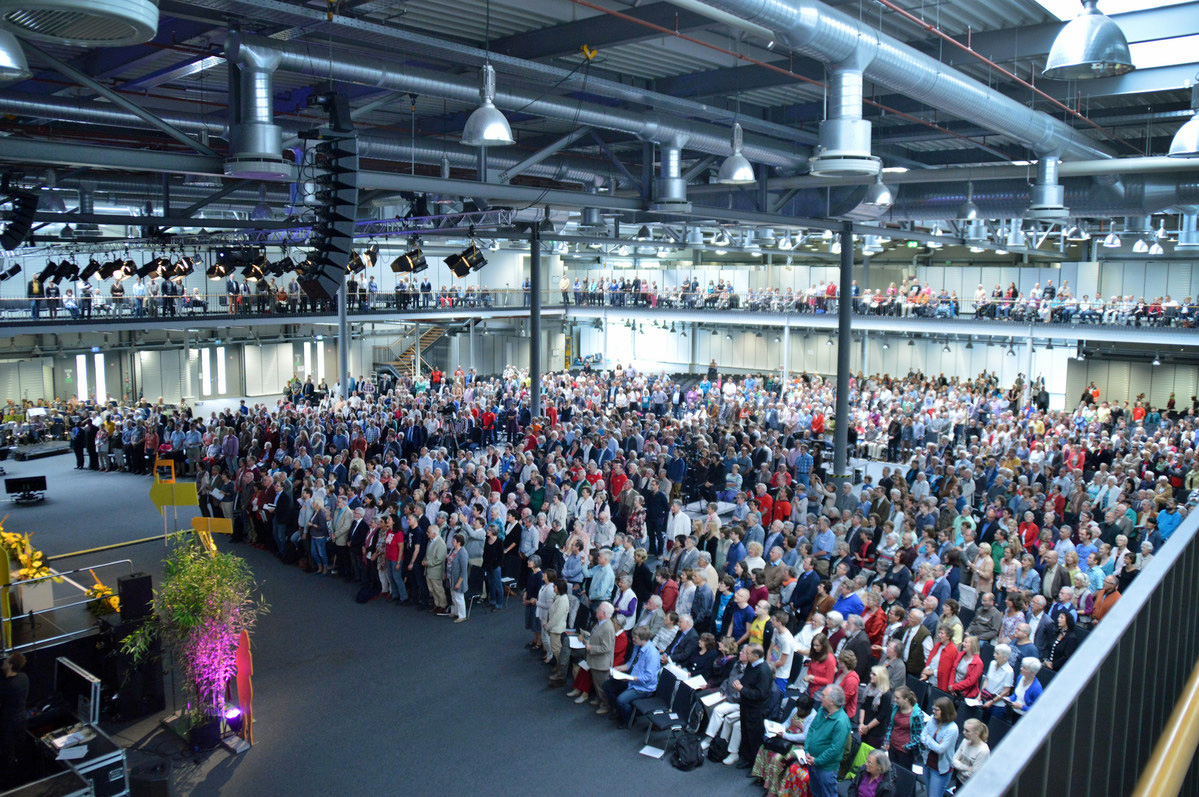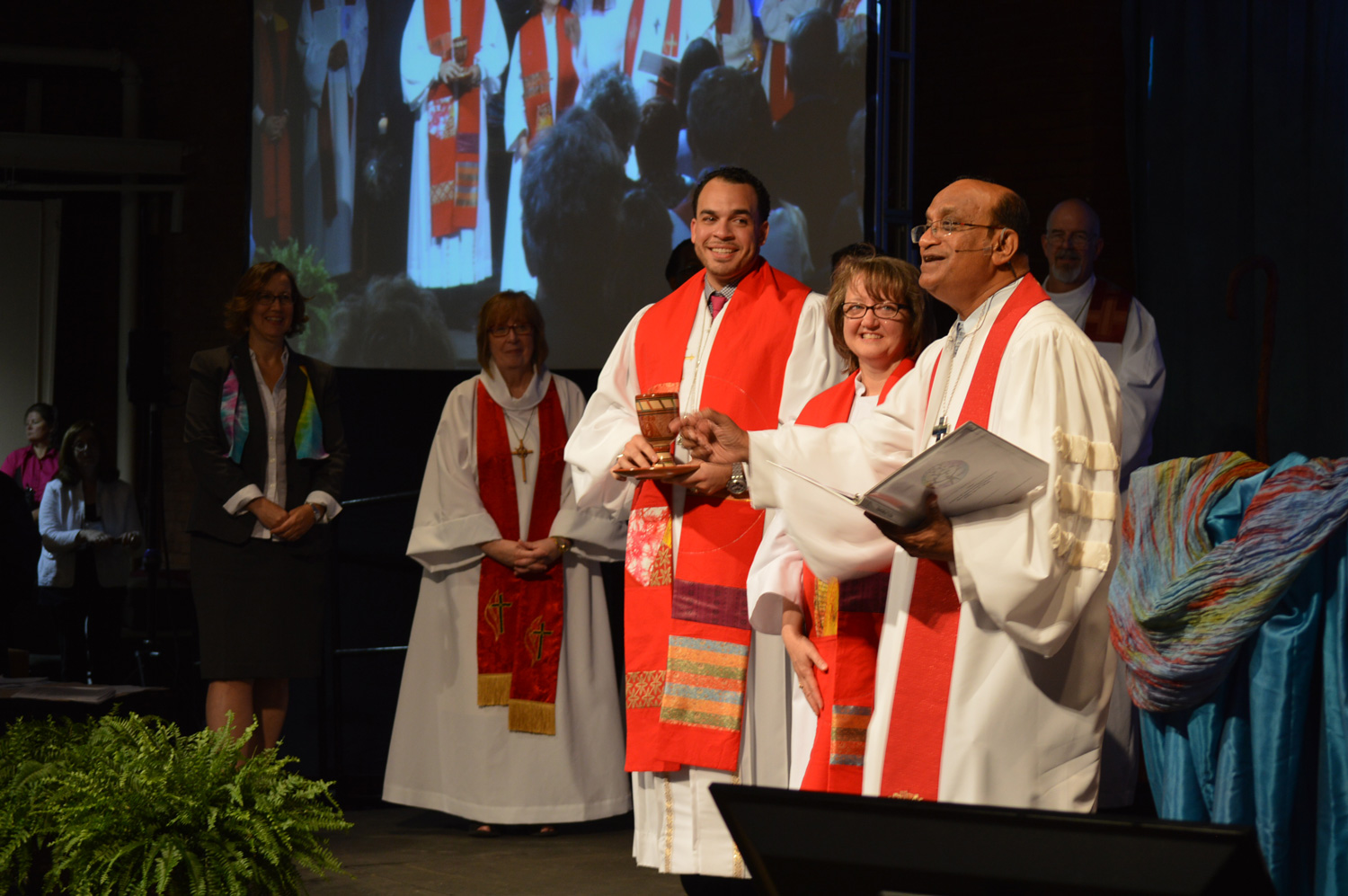
United Methodist clergy are prayed over by their bishop (as those pictured in the West Angola Annual Conference in 2006), empowered by the Holy Spirit, and authorized by the church for their life and work. File photo by Mike DuBose, United Methodist Communications.
Ordination is a powerful moment in the life of those who have been called to specialized ministry within the church. At ordination, they are prayed over, empowered by the Holy Spirit, and authorized by the church for their life and work as a deacon or elder.
After years of discernment with the assistance of one's local United Methodist congregation, district, and annual conference board of ordained ministry; after receiving a master's degree; and after a period of supervised service in their ministry, candidates kneel before their bishop to be ordained.
Ordination is "anchored in the sacrament of baptism and the ministry of the baptized," reads the introduction to the Services for the Ordering of Ministry in The United Methodist Church. It is not, however, a separate sacrament in The United Methodist Church. The acts of ordaining, commissioning, consecrating, and certifying people for ministry "are based on what is already implicit in baptism, and rest upon the essential ministry given to all Christians in baptism," the document continues.
By Water and the Spirit, The United Methodist Church's official statement on baptism, describes this ministry, "Through baptism, God calls and commissions persons to the general ministry of all Christian believers…We exercise our calling as Christians by prayer, by witnessing to the good news of salvation in Christ, by caring for and serving other people, and by working toward reconciliation, justice, and peace in the world. This is the universal priesthood of all believers."
The Rev. Taylor Burton-Edwards, director of worship resources with Discipleship Ministries of The United Methodist Church, clarifies, "The vows of ordination specify how those entering into the order of deacon or elder are going to live out the baptismal covenant in light of their work in the life of that order."
The United Methodist Church has two clergy orders, deacons and elders. Elders are ordained and authorized to serve the church in ministries of proclaiming God's word, administering the sacraments, ordering the work of the church, and serving congregations and communities. Deacons are ordained and authorized to ministries of word, service, justice and compassion that connect congregations and other ministries of the church with their communities and the world.
"Ordination to this ministry [elder or deacon]," states the United Methodist Book of Discipline, "is a gift from God to the church."

Ordination services are typically hosted by annual conferences around their yearly gatherings, like this service of the Germany South Annual Conference in 2015. Photo by Klaus Ulrich Ruof, Germany.
Ordination service
Annual conferences typically host ordination services in conjunction with their yearly gatherings. "The Order for the Ordination of Deacons and Elders" produced through the collaboration of Discipleship Ministries, The General Board of Higher Education and Ministry, The General Commission on Christian Unity and Inter-religious Concerns, The Council of Bishops, and the United Methodist Publishing House as approved by General Conference, guides the worship.
Early in the service, the presiding bishop leads the congregation in recognition of the common ministry of all Christians and a reaffirmation of their baptismal vows. "Ministry is the work of God, done by the people of God," the bishop says standing near a baptismal font. "Through baptism all Christians are made part of the priesthood of all believers, the church, Christ's body, made visible in the world. We all share in Christ's ministry of love and service for the redemption of the human family and the whole of creation."
The bishop then asks the congregation to remember their baptism—meaning, remember that they are baptized—and be thankful. The people respond, "We remember our baptism and affirm our common ministry."
Ordination
After the presentation of the candidates and the proclamation of the Word, the bishop asks the candidates a series of questions. The first group of questions ask about their call to ordained ministry, their faith in the triune God, and their trust that the Bible is the unique and authoritative standard for the church's faith and life.
The bishop then asks several questions about how they will live into their life and work as an elder or deacon in The United Methodist Church. The response to each of these is, "I will, with the help of God."
The ordinand then kneels before the bishop who lays both hands on the head of the candidate and prays, "Father Almighty (Almighty God), pour upon Name the Holy Spirit for the office and work of a(n) elder/deacon in Christ's holy church."
The introduction to the Services for the Ordering of Ministry in The United Methodist Church explains the work of the Spirit of God in ordination. "Ordination is chiefly understood as the act of the Holy Spirit," it reads. "As a liturgical act, ordination is also understood as the public prayer of the church confirming the Spirit's call to individuals and asking for them gifts and power for the ministry of deacon or elder."
Elders and deacons rely on the Holy Spirit to equip and empower them throughout their lives for the work to which they are called. The bishop's prayer if offered on behalf of the whole church, asking for an outpouring of the Holy Spirit upon the life of the one being ordained.
"We believe the Spirit answers 'yes,' and is in fact poured out at that point," Burton-Edwards says.
Next the candidate's hands are placed on a Bible and the bishop lays both hands on the hands of the ordinand, authorizing him or her for ministry in The United Methodist Church.

One of the first things many new clergy do after their ordination is help serve communion during the ordination worship service. Photo by Beth DiCocco, New England Conference.
With an elder, the bishop says, "Name, take authority as an elder to preach the Word of God, to administer the Holy Sacraments and to order the life of the Church, in the name of the Father, and of the Son, and of the Holy Spirit."
With a deacon, the bishop's words are changed to fit the work of deacons, "Name, take authority as a deacon to proclaim the Word of God and to lead God's people in ministries of compassion and justice; in the name of the Father, and of the Son, and of the Holy Spirit."
Burton-Edwards explains this two-step process, "The first act is ordination proper. The second is authorization for ministry. You need both—the work of the Spirit and the support of the church—in order to function as an elder or as a deacon in The United Methodist Church."
If you are sensing a call to ministry, you can learn much more about the process toward ordination from the General Board of Higher Education and Ministry.
*Joe Iovino works for UMC.org at United Methodist Communications. Contact him by email or at 615-312-3733.
This article was first published on January 29, 2016.

